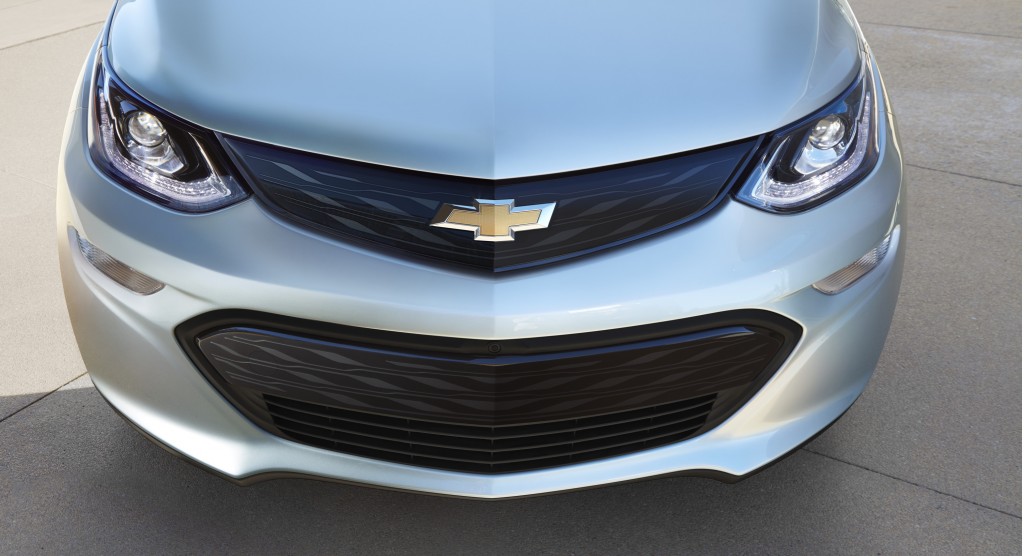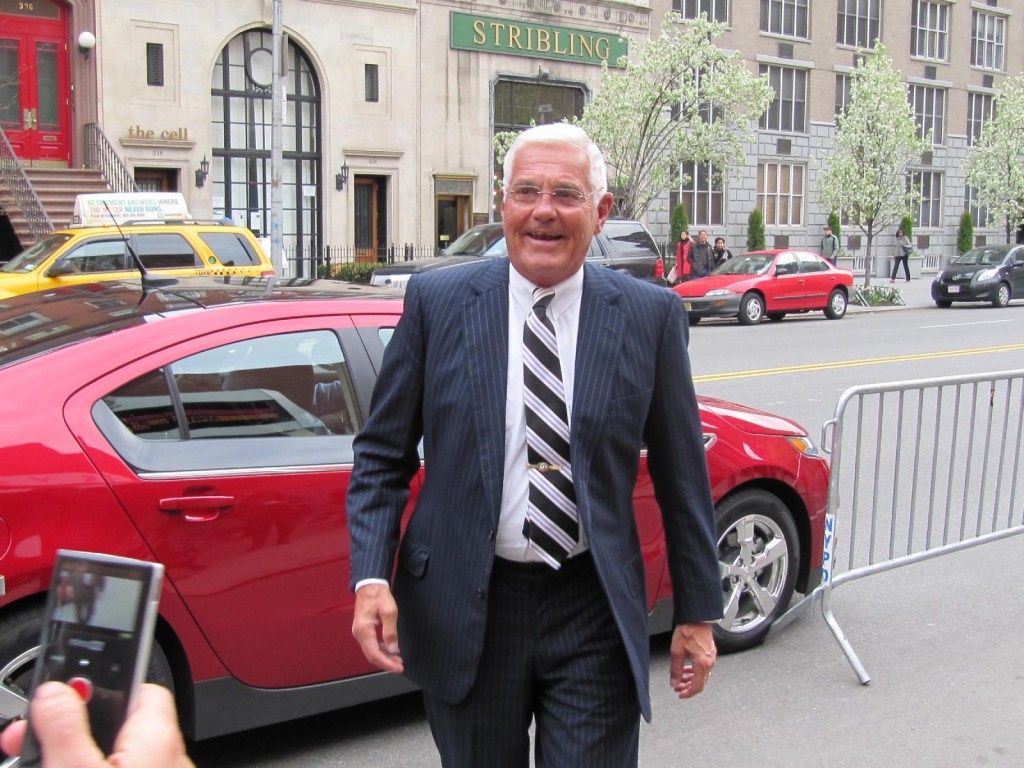
2017 Chevrolet Bolt EV
Electric-car advocates are often passionate, with memories long enough to remember GM's 2004 destruction of its pioneering fleet of EV1 electric cars.
Since then, the company has built and sold two generations of the Chevrolet Volt, with the launch of the 2017 Chevrolet Bolt EV imminent within a year—before Nissan, Tesla, BMW, or any other plug-in pioneer manages to field a 200-mile electric cars below $40,000.
Despite that, at least some electric-car owners and fans seem to retain a considerable undercurrent of skepticism about Detroit's largest automaker and its intentions.
DON'T MISS: Is Chevy Bolt EV's Main Mission To Marginalize Tesla Electric Cars?
The current 2016 Chevy Spark EV, which the Bolt EV will replace, is widely acknowledged to be a compliance car.
That means a low-volume model, offered only in limited markets in numbers just high enough to meet California's zero-emission sales rules. Chevy's volume plug-in model for five years has been the Volt.
The ZEV rules will start to ramp up significantly in number in 2018, rising by an additional 1 percent of sales each year starting in 2018, and applying to more automakers.
2017 Chevrolet Bolt EV - 2016 Consumer Electronics Show
Despite all the hoopla over the Tesla Model 3—for which 400,000 people have put down $1,000 with no guaranteed timetable for delivery—the 2017 Bolt EV will clearly be the first mass-priced 200-mile electric car on the market.
That will happen at the end of this year or early next year, with the first cars going to California and other markets where electric cars are a known quantity.
GM has said that it expects first-year volume for the Bolt EV to be 25,000 to 30,000 cars.
ALSO SEE: How GM plans to market Chevy Volt plug-in hybrid, Bolt EV electric car
That's about 10 times the sales of the Spark EV last year, and the equal of the highest sales year ever for a plug-in vehicle of any sort in the U.S. (the Nissan Leaf in 2014).
But is the Bolt EV a compliance car nonetheless, one that GM will sell only because those sales will let it comply with the California ZEV rules and help it meet steadily rising corporate average fuel economy regulations through 2025?
No less an industry icon than GM's former product czar, Bob Lutz, appears to think so.

'Revenge of the Electric Car' premiere: Bob Lutz arrives in a Chevy Volt
Lutz is widely credited as the man who kicked GM's product development process into the 21st century, replacing "me too" vehicles of the 1990s with stylish, well-equipped, pleasant, and fully competitive entries in multiple segments.
GM's biggest problem now seems to be not the cars themselves, but the brand on the grille. Too many Toyota, Honda, Nissan, Hyundai, and Kia buyers simply don't think of Chevrolet when cross-shopping.
Lutz also protected the nascent Volt program from cancellation by the White House Auto Task Force during GM's 2009 bankruptcy and government-backed restructuring.
CHECK OUT: GM Won't Fund CCS Fast-Charging Sites For 2017 Chevy Bolt EV
His comments came in a roundtable panel discussion held last summer by industry trade journal Automotive News, highlighted in an article published on GM-Volt.com in December.
In it, he noted the rising prices of GM's full-size SUVs like the Chevrolet Tahoe, GMC Yukon, and Cadillac Escalade.
Just a few years ago, Lutz suggested, the Tahoe started at $42,000. These days, "you can't touch a Chevy Tahoe for under about $65 [thousand]," and the Escalade can exceed $100,000.

2017 Chevrolet Bolt EV
The reason for that, Lutz continues, is that the very profitable full-size SUVs and pickup trucks—among the highest-volume vehicles sold in the U.S.—are subsidizing the development and sale of plug-in and zero-emission vehicles.
"What this is, is companies trying to recover what they’re losing at the other end with what I call compliance vehicles, which are Chevy Volts, Bolts, plug-in Cadillacs, and fuel-cell vehicles.”
Is that a fair characterization?
On the one hand, GM has hinted that it can build as many Bolt EVs in its first year as Nissan sold lower-range Leafs in that car's best year to date.
(Of course, an earlier generation of GM executives issued projections for the 2011 and 2012 Volt too, which proved to be wildly optimistic.)
![2011 Chevrolet Volt, before lease return, Hudson Valley, NY, Aug 2014 [photo: David Noland] 2011 Chevrolet Volt, before lease return, Hudson Valley, NY, Aug 2014 [photo: David Noland]](https://images.hgmsites.net/lrg/2011-chevrolet-volt-before-lease-return-hudson-valley-ny-aug-2014-photo-david-noland_100480791_l.jpg)
2011 Chevrolet Volt, before lease return, Hudson Valley, NY, Aug 2014 [photo: David Noland]
Its lithium-ion cell supplier, LG Chem, is opening new cell fabrication plants across the globe, has contracts to supply cells to more than a dozen manufacturers, and is clearly willing to increase production capacity to meet demand.
On the other hand, Chevy's marketing plans for the Bolt EV—and for that matter the 2016 and 2017 Volt models already on sale—appear to rely on reaching out to customers very much like those who have already bought a Volt.
And, according to marketing executive Darin Gesse, they presume that the buyers will come into Chevy showrooms knowing more than the salespeople trying to get them to close a deal.
Moreover, GM said flat out it has no plans to put any money into setting up any DC fast-charging stations, which allow electric-car drivers to travel comfortably beyond their home radius with recharging stops that restore up to 80 percent of battery range in 20 to 30 minutes.
The model for that is the Tesla Supercharger network—and Audi, BMW, Nissan, Porsche, and Volkswagen have all publicly committed to support expanded DC fast-charging in the U.S. in various ways.

2016 Chevrolet Tahoe
So is the Chevy Bolt EV a volume car that GM will try to market and sell to as many people as possible as hard as it does, for example, its high-selling Silverado pickup trucks, the Tahoe SUV, the new Cruze compact sedan and Malibu mid-size sedan, or the upcoming new Equinox and Traverse crossover SUVs?
We reached out to Chevrolet directly and asked: Is the 2017 Bolt EV a compliance car?
Steve Majoros, marketing director for Chevrolet cars and crossovers, responded as follows:
At Chevrolet, we put the customer at the center of everything we do. That means offering a variety of products and services to meet a variety of customer needs. Bolt EV is just one of many examples, and in this case, of solving the range and cost equation that has frustrated consumers for some time in the EV space—and doing it with a car that is not just a great electric car, but a great car loaded with innovations … all in a packaging/configuration that offers tremendous flexibility and versatility.
We feel confident that the Bolt EV will appeal to a number of customers interested in the electric-car space, and will do so for customers in all 50 states. As such, we can confidently say Bolt EV is not a exclusively “compliance play.”
2017 Chevrolet Bolt EV
Based on our success with Volt, and consumer and dealer receptivity, we know there is both demand and the ability of the nationwide Chevrolet dealer network to provide the sales and service experience that has made us the best full-line manufacturer in both according to JD Power.
While build and distribution plans are not yet finalized, given the propensity for electric-car acceptance in markets like California, we will certainly work to ensure we can satisfy demand in those markets which have shown greater rates of EV adoption, supporting infrastructure, programs and general consumer acceptance.
It is true that the ZEV credit landscape changes in 2018—but it can be argued that there are “50 state” compliance issues such as CAFE and greenhouse gas that not just Chevrolet but all makers are working to meet. Bolt EV is one part of this equation along with a number of product improvements and innovations (powertrains, transmissions, mixed material use, design, etc) that provide what customers want – greater performance, better fuel economy and greater value.
You can make of those statements what you will.
We note that Majoros underscores a focus on markets that have already proven themselves to be receptive to plug-in electric cars.

Engineering development version of Chevrolet Bolt EV, Las Vegas, Jan 2016
That's sensible, but it's also far from transformative.
Based on our drive of a prototype Bolt EV development vehicle in January, we expect the car itself to be solid, competent, functional, and an advance in the state of the battery-electric vehicle art.
Whether Chevrolet can reach out beyond "the usual suspects" to position its 2017 Bolt EV as an electric car that offers an affordable, viable replacement for a gasoline vehicle remains to be seen.
Because that's clearly how Tesla Motors, which has numerous challenges GM doesn't face, is presenting the Model 3: a no-compromises electric car, with a nationwide DC fast-charging network already in place when it arrives.
Buy some popcorn and watch as it all unfolds.
_______________________________________












